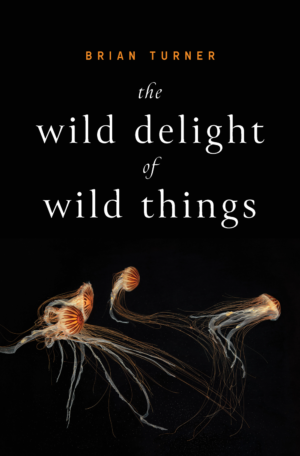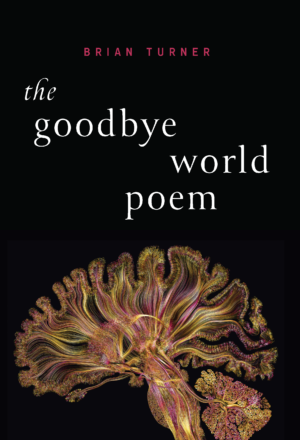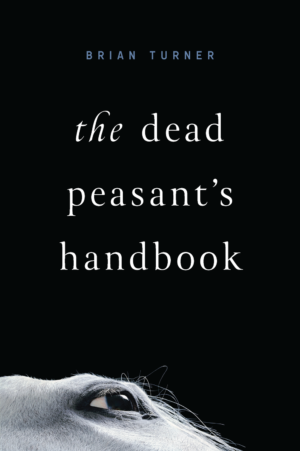In Their Own Words
Brian Turner on three poems

The Immortals
Bell-shaped and translucent, jellyfish begin their ascent from the ocean floor.
They’ve completed a novel process in the animal kingdom: transdifferentiation.
It’s a reversal of the biological cycle as we know it—undoing the narrative arc
tracing birth to adulthood before the inevitable decline and death. The jellyfish
upend everything we know about death in flora and fauna. At the cellular level,
they grow younger when the time comes to die. They transform backwards
into a nascent version of themselves before starting the process over.
It doesn’t mean they are incapable of dying—it’s simply not in their nature.
They rise through the midnight-dark waters and into bands of sunlight
the way thought forms in the subconscious before burning in waves
across the neocortex of the human brain. And as they rise,
fathom by fathom, they become lighter. As each incarnation
returns, history unfolds and the world is made new. They rise
into the Age of Agriculture with its domestication of wild grain,
with the comprehension of seed to stem to fruit. They witness
the emergence of cities. Wheels and alphabets and metallurgy.
Buddha and Confucius, Jesus and Mohammed. The Age of Flight
and the Age of Information. The jellyfish descend to regenerate
and then rise through it all, limpid and curious, as astronauts
step upon the lunar surface and as armies kill each other
without cease. Humans turn their thoughts toward Mars
and beyond, as the jellyfish sink down into the ancient shadow
where they have always gone, as if death were a form of sleep,
a dream from which they are revived, one lifetime to another,
cycling through the stages of life as the elastic architecture
of their bodies is made strange and new all at once. Blooming.
Starfields glimmer in the wavetops above. Sunlight scatters at dawn
and dusk. The ocean is a silver film of moonlight stilling itself.
And through it all, the jellyfish. The immortals. They have come
to watch galaxies loosen their spiraling stars as photons
shimmer on the interstellar breeze. They are steeped in time.
They have learned to reinvent themselves in defiance
of the body’s undoing. They rise from their own deaths.
They rise from the bottom of the sea. Soft bells,
diaphanous and fine, the universe offers them wonder
and they gather in their multitudes to take it all in.
**
Memory and time. The finite and the infinite. Nature. Humanity. The cycling of moments and the history of the world. It all sounds so grand and operatic, doesn’t it? And yet—this is the world we inhabit. This is the very heart of the quotidian. All of this exists within every moment of our lives, minute by minute, hour by hour. Just imagine. A newborn is taking its first breath—even now, as you read this. Another emerges into a life, its lungs filling with oxygen. And imagine those, too, at the end of their lives, dying, their torsos sinking into themselves, empty of air, as loved ones hold their hands and whisper them on their way. That’s happening now, too.
In 2019, near the banks of the Hooghly River in Kolkata, I watched artists apply river mud to the wooden armatures of lions and elephants and humans and gods they’d fashioned with their own hands. These are temporary sculptures made to be given back to the river on floats that disassemble as they go—and so the process begins all over again.
There’s something in that cycling of mud that inspires this poem, as well as the rise and fall of jellyfish I learned about a few years ago. There is a kind of wisdom available here, I think. It’s something that resonates with my body, though my mind has yet to fully grasp it all. That’s why I turn to the poem—to help guide me through the meditation. I’m learning something about the nature of our existence and the availability of surprise. It is, I think, another way for me to fall in love with the world once more.
1:41
She often sculpted the air with her hands as she spoke,
gesturing the world into being, and I’m reminded of this
as I restart the video so that I might be with her again,
the daylight flooding in through the window behind her
a day I can’t place on a calendar, though it’s summer,
2016, and in a moment she’s going to say, Oh, how fun,
as she opens a package filled with tiny prayer bowls,
showing me how she’ll hide away messages in each
before shipping them to loved ones around the globe.
In a few seconds, she’ll blow a kiss to me and we’ll say
I love you before she follows with Later, maybe we can…
and I’ll never hear the completion of that thought—
I’m left with this 1-minute, 41-second video, this slipping
into the past, the 2020s a blurring of images and voices
that fade as soon as she describes the biplanar wings
of a dragonfly she’s conjured from the empty air, jeweled
in its beauty, delicate, its tremulous body waiting for her
to breathe the concept of flight that makes it so.
To do this, her left hand is laid open as her right
caresses the air in a motion that shapes the life-form
being awakened there, flower by lizard by bird, a sweet
kind of magic from within the domain of the imagination.
Petals unfurl their velvet tongues at her lightest touch.
A cat’s tail curls its subtle questions into the languid air.
Birds sing their way closer to me, whether anyone
can hear them or not, while the panting lizards
cool themselves in the shadows. I move the cursor.
Press play again. If only to hear Ilyse talk about pleasure,
to hear her say, It’s true, I get so much joy in doing this, and
to linger with her there, in that brief suspension—
her head tilting as if sunlight were pouring into her
while she holds an invisible prayer in her fingertips
that she will soon place within the bowl of her hand.
**
The English language fails me. Especially in terms of verb tenses. Maybe it does the same for you?
The past continuous tense, the past perfect continuous, the present perfect. Each proves incapable of housing the nature of the thoughts I ask of them. The dead remain marooned on the historical timeline. They are not given a living presence in our lives, here within the word now.
We need another verb tense, a whole new way of speaking.
Poetry hasn’t solved this problem for me, but since my love (poet Ilyse Kusnetz) crossed over in 2016, poetry has helped me to discover ways to be both in conversation with her and to dwell with her in the blurry and mysterious landscape of time. Part architecture, part transport, poems make it possible for us to be with those we love once more—and to share that experience with others.
In hindsight, I can see how selfish I was with our love and with our relationship. But now that she’s crossed into what I sometimes call the river of stars, I want to share her with as many as possible. It’s my hope that, in some small way, a reader might meet and fall in love with Ilyse—and the poem is the vehicle that makes this possible. This is my hope. That she might inhabit the imagination of others. That she might, through poetry, continue to be a part of this world. A part of you. Conjuring jeweled beauty from the empty air right in front of you. That you might hear her voice in the air, as I have and do, saying, Oh, how fun…
That’s the prayer I place within the bowl of your own hand now, as I share this poem with you.
Sunflowers
What they don’t tell you about war
is how much a bank ledger
might shape a decision tree.
The price of fuel. Sunflower oil. Durable
goods when they’re floating on an ocean
with no delivery in sight. That
bullets can skip along the surface of a wall
like stones over water.
That it’s a bad idea to tape the sheet glass
windows of your home, but smart
to roll down the windows of a car
when fleeing a firefight. That
you should open your mouth
to avoid rupturing your eardrums
when a shockwave rolls by. That
civilians are the bravest of all.
See how they face the invaders, saying
Take these seeds and put them in your pockets,
so at least sunflowers will grow
when you all lie down here.
What they don’t tell you about war
is that a soldier’s oath is not only
to be the one who puts out the fire, but
to be the one who starts the fire
to begin with, to be the one
who carves a hollow center
deep into the word suffering. War
is born of the obscene,
a disfiguration of words like love
or humanity. This much we know.
These things we do. These ghosts
we live with. How they call out to us
sometimes, asking for water. Such
a simple thing. A glass of water.
**
During the Russian invasion of Ukraine in February of 2022, I was—like many around the world, I’m sure—stunned by the bravery of the Ukrainian people. The poem quotes something a Ukrainian woman said to armed soldiers as they took over the streets and neighborhoods of her city. She was defiant. Resistant. Poetic.
I have always considered civilians in war zones to be the bravest of all. And so hearing her speak of sunflowers and death and inevitability made me consider other things I know of war and conflict. Things I’ve learned firsthand and things I’ve learned from others. Like poet and journalist Eliza Griswold. I reached out to Eliza years ago to ask if she might write a short essay for a book I co-edited, called The Strangest of Theatres (McSweeney’s Books/The Poetry Foundation, 2013). And it was in her piece, “Thirteen Ways of Working in a War Zone,” that I learned one should roll down their car windows if they find themselves in a firefight.
These things we learn.
These things we learn in this beautiful and harrowing world.
“The Immortals” is from The Wild Delight of Wild Things (Alice James Books, 2023)
“1:41” is from The Goodbye World Poem (Alice James Books, 2023)
“Sunflowers” is from The Dead Peasant’s Handbook (Alice James Books, 2023)





